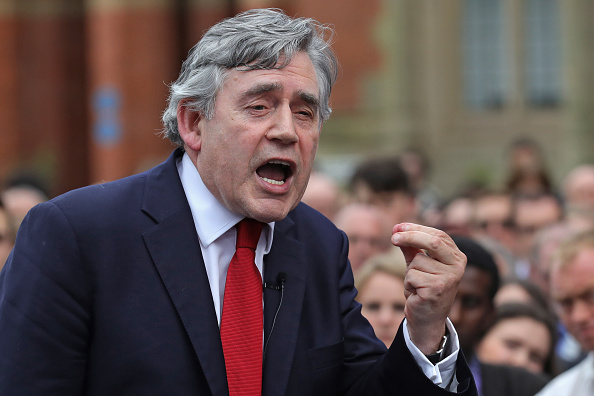What is Gordon Brown's Net Worth?
Gordon Brown is a British politician who has a net worth of $5 million. Gordon Brown served as the Prime Minister of the United Kingdom and the Leader of the Labour Party from 2007 to 2010. Before that, he was Chancellor of the Exchequer from 1997 to 2007, and a Member of Parliament from 1983 to 2015. Brown is particularly renowned for his record-long chancellorship, during which he oversaw the longest period of economic growth in the history of Britain.
Early Life and Education
James Gordon Brown was born on February 20, 1951 in Giffnock, East Renfrewshire, Scotland to Jessica and Church of Scotland minister John. With his brothers John and Andrew, he was raised in a manse in Kirkcaldy, Fife. Brown was educated at Kirkcaldy West Primary School and Kirkcaldy High School before being admitted to the University of Edinburgh at just 16 years of age. He graduated from Edinburgh with a degree in history in 1972. A decade later, Brown earned his PhD in history from the university.
Career Beginnings
Before joining the government, Brown lectured in politics at the Glasgow College of Technology from 1976 to 1980. In 1979, he ran his first campaign for Parliament, for Edinburgh South, but lost to Conservative candidate Michael Ancram. After that, in the early 1980s, Brown worked as a journalist at Scottish Television.
Member of Parliament
On his second campaign for Parliament, in 1983, Brown was elected as a Labour MP for Dunfermline East. Later in the decade, he served as Shadow Chief Secretary to the Treasury and then Shadow Secretary of State for Trade and Industry. In 1992, Brown became Shadow Chancellor. He remained a MP for Dunfermline East until 2005, and subsequently served as MP for Kirkcaldy and Cowdenbeath from 2005 to 2015.
Chancellor of the Exchequer
Following the Labour Party's landslide victory in the 1997 general election, Brown was appointed as Chancellor of the Exchequer under Prime Minister Tony Blair. He held the position for a little over a decade, making him the longest-serving Chancellor in modern British history. During his very popular tenure, Brown oversaw major reforms to Britain's economy, including the granting of operational independence to the Bank of England, the expansion of the Treasury's powers to cover domestic policy, and the transference of banking supervision to the Financial Services Authority. He also devised the five economic tests, which kept the UK from adopting the euro. Although he presided over the longest period of economic growth in British history, Brown was not without criticism. Among his controversial moves were the abolition of advance corporation tax relief, the sale of UK gold reserves, and the removal of the 10% starting rate of income tax.

(Christopher Furlong/Getty Images)
Prime Minister
The heavy favorite to succeed Blair as Prime Minister, Brown announced his bid for Leader of the Labour Party in the spring of 2007. He won the position that June, and following Blair's resignation, he became the new Prime Minister. During his premiership, which continued the New Labour movement he had fostered with Blair, Brown oversaw the introduction of rescue packages to keep banks afloat during the 2008 financial crisis. Also in 2008, his government passed the world's first Climate Change Act. In 2009, Brown began an inquiry into Britain's role in the ongoing Iraq War, and in 2010 he introduced the Equality Act to update and supplement prior anti-discrimination laws.
Although Brown was popular right after he became Prime Minister, he was criticized when he failed to call a snap election in 2007, and by 2008 the popularity of the Labour Party had declined amid the Great Recession. This culminated in the 2010 general election, in which Labour lost 91 seats and there was a hung parliament. The Conservative Party, which had won the most seats, formed a coalition government with the Liberal Democrats, and Conservative Leader David Cameron became the new Prime Minister. In the Labour Party, Brown was succeeded as Leader by Ed Miliband.
Post-premiership
After leaving office, Brown returned to the backbenches and continued serving as MP for Kirkcaldy and Cowdenbeath until 2015. He also wrote the book "Beyond the Crash," about the effects and possible legacy of the 2008 financial crisis. In other major activities, Brown played an instrumental role in the campaign to maintain the UK during the 2014 Scottish independence referendum. Elsewhere, he served as the United Nations Special Envoy for Global Education and as the World Health Organization's Ambassador for Global Health Financing. In 2024, Brown was awarded the Order of the Companions of Honour by King Charles II for his contributions to public and charitable services.
Personal Life
Earlier in his life, Brown dated journalist Sheena McDonald and Margarita, Crown Princess of Romania. In 2000, he married Sarah Macaulay, with whom he has two sons named John and James. The couple had previously had a daughter, Jennifer, who died ten days after her premature birth.
/2010/01/Gordon-Brown.jpg)
/2021/12/Tony-Blair.jpg)
/2014/09/GettyImages-977878798.jpg)
/2025/05/Keir-Starmer.jpg)
/2012/05/GettyImages-106419567.jpg)
/2013/12/david-1.jpg)
/2019/04/rr.jpg)
/2009/09/Cristiano-Ronaldo.jpg)
/2020/04/Megan-Fox.jpg)
/2019/10/denzel-washington-1.jpg)
/2019/11/GettyImages-1094653148.jpg)
/2009/09/Jennifer-Aniston.jpg)
/2009/11/George-Clooney.jpg)
/2018/03/GettyImages-821622848.jpg)
/2020/02/Angelina-Jolie.png)
/2009/09/Brad-Pitt.jpg)
:strip_exif()/2015/09/GettyImages-476575299.jpg)
/2010/01/Gordon-Brown.jpg)
/2021/12/Tony-Blair.jpg)
/2018/12/Theresa-May.jpg)
/2014/09/GettyImages-977878798.jpg)
/2012/05/GettyImages-106419567.jpg)
/2025/05/Keir-Starmer.jpg)
/2016/08/Jeremy-Corbyn.jpg)
/2020/06/taylor.png)
:strip_exif()/2009/09/P-Diddy.jpg)
/2020/01/lopez3.jpg)
/2017/02/GettyImages-528215436.jpg)